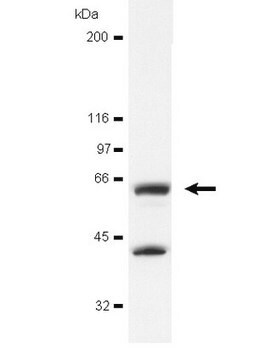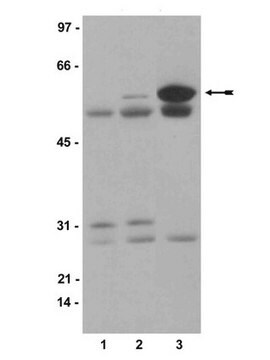05-184
Anti-Src Antibody, clone GD11
clone GD11, Upstate®, from mouse
Sinónimos:
Anti-ASV, Anti-SRC1, Anti-THC6, Anti-c-SRC, Anti-p60-Src
About This Item
Productos recomendados
biological source
mouse
antibody form
purified immunoglobulin
antibody product type
primary antibodies
clone
GD11, monoclonal
species reactivity
avian, mink, mouse, rat, human
manufacturer/tradename
Upstate®
technique(s)
immunoprecipitation (IP): suitable
western blot: suitable
isotype
IgG1
NCBI accession no.
UniProt accession no.
shipped in
dry ice
target post-translational modification
unmodified
Gene Information
human ... SRC(6714)
General description
Some tumor-inducing retroviruses (such as Rous sarcoma virus (RSV)), contain a gene called v-src (viral-sarcoma). It was found that the v-src gene in RSV is required for the formation of cancer.
Src tyrosine kinases transmit integrin-dependent signals central to cell movement and proliferation. Hallmarks of v-src induced transformation are rounding of the cell and the formation of actin rich podosomes on the basal surface of the cell. These structures are correlated with increased invasiveness, a process thought to be essential for metastasis.
v-src lacks the C-terminal inhibitory phosphorylation site, and is therefore constitutively active as opposed to normal src (c-src) which is only activated under certain circumstances where it is required (e.g. growth factor signaling). v-src is therefore an instructive example of an oncogene whereas c-src is a proto-oncogene.
Specificity
Immunogen
Application
Signaling
Cytoskeletal Signaling
Quality
Target description
Physical form
Storage and Stability
Analysis Note
Positive Control Included: Non-Stim A431 Cell Lysate (12-301). Chicken Embryo Fibroblast (CEF) cells expressing Src protein and plated on fibronectin or Non-stimulated human A431 cell lysate
Legal Information
Disclaimer
¿No encuentra el producto adecuado?
Pruebe nuestro Herramienta de selección de productos.
Storage Class
10 - Combustible liquids
wgk_germany
WGK 2
Certificados de análisis (COA)
Busque Certificados de análisis (COA) introduciendo el número de lote del producto. Los números de lote se encuentran en la etiqueta del producto después de las palabras «Lot» o «Batch»
¿Ya tiene este producto?
Encuentre la documentación para los productos que ha comprado recientemente en la Biblioteca de documentos.
Nuestro equipo de científicos tiene experiencia en todas las áreas de investigación: Ciencias de la vida, Ciencia de los materiales, Síntesis química, Cromatografía, Analítica y muchas otras.
Póngase en contacto con el Servicio técnico







